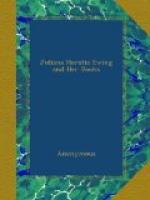“Will the donkey be cooked when he is fat?” asked my mother.
“I smell valerian,” said my father, on which she put out her nose, and he ran at it with his prickles. He always did this when he was annoyed with any of his family; and though we knew what was coming, we are all so fond of valerian, we could never resist the temptation to sniff, just on the chance of there being some about.
Then, the following season, we find the Hedgehog Son grown into a parent, and, with the “little hoard of maxims” he had inherited, checking the too inquiring minds of his offspring:
“What is a louis
d’or?” cried three of my children; and
“What is
brandy?” asked
the other four.
“I smell valerian,” said I; on which they poked out their seven noses, and I ran at them with my spines, for a father who is not an Encyclopaedia on all fours must adopt some method of checking the inquisitiveness of the young.
One more quotation must be made from the end of the story, where Father Hedgehog gives a list of the fates that befell his children:
Number one came to a sad end. What on the face of the wood made him think of pheasants’ eggs I cannot conceive. I’m sure I never said anything about them! It was whilst he was scrambling along the edge of the covert, that he met the Fox, and very properly rolled himself into a ball. The Fox’s nose was as long as his own, and he rolled my poor son over and over with it, till he rolled him into the stream. The young urchins swim like fishes, but just as he was scrambling to shore, the Fox caught him by the waistcoat and killed him. I do hate slyness!
It seems scarcely conceivable that any one can sympathize sufficiently with a Hedgehog as to place himself in the latter’s position, and share its paternal anxieties,—but I think Julie was able to do so, or, at any rate, her translations of the Hedgepig’s whines were so ben trovati, they may well stand until some better interpreter of the languages of the brute creation rises up amongst us. As another instance of her breadth of sympathy with beasts, let us turn to “A Week Spent in a Glass Pond” (which also came out in Aunt Judy’s Magazine for 1876), and quote her summary of the Great Water-beetle’s views on life:
After living as I can, in all three—water, dry land, and air,—I certainly prefer to be under water. Any one whose appetite is as keen, and whose hind-legs are as powerful as mine, will understand the delights of hunting, and being hunted, in a pond; where the light comes down in fitful rays and reflections through the water, and gleams among the hanging roots of the frog-bit, and the fading leaves of the water-starwort, through the maze of which, in and out, hither and thither, you pursue and are pursued, in cool and skilful chase, by a mixed company of your neighbours, who dart, and shoot, and dive, and come and go,




